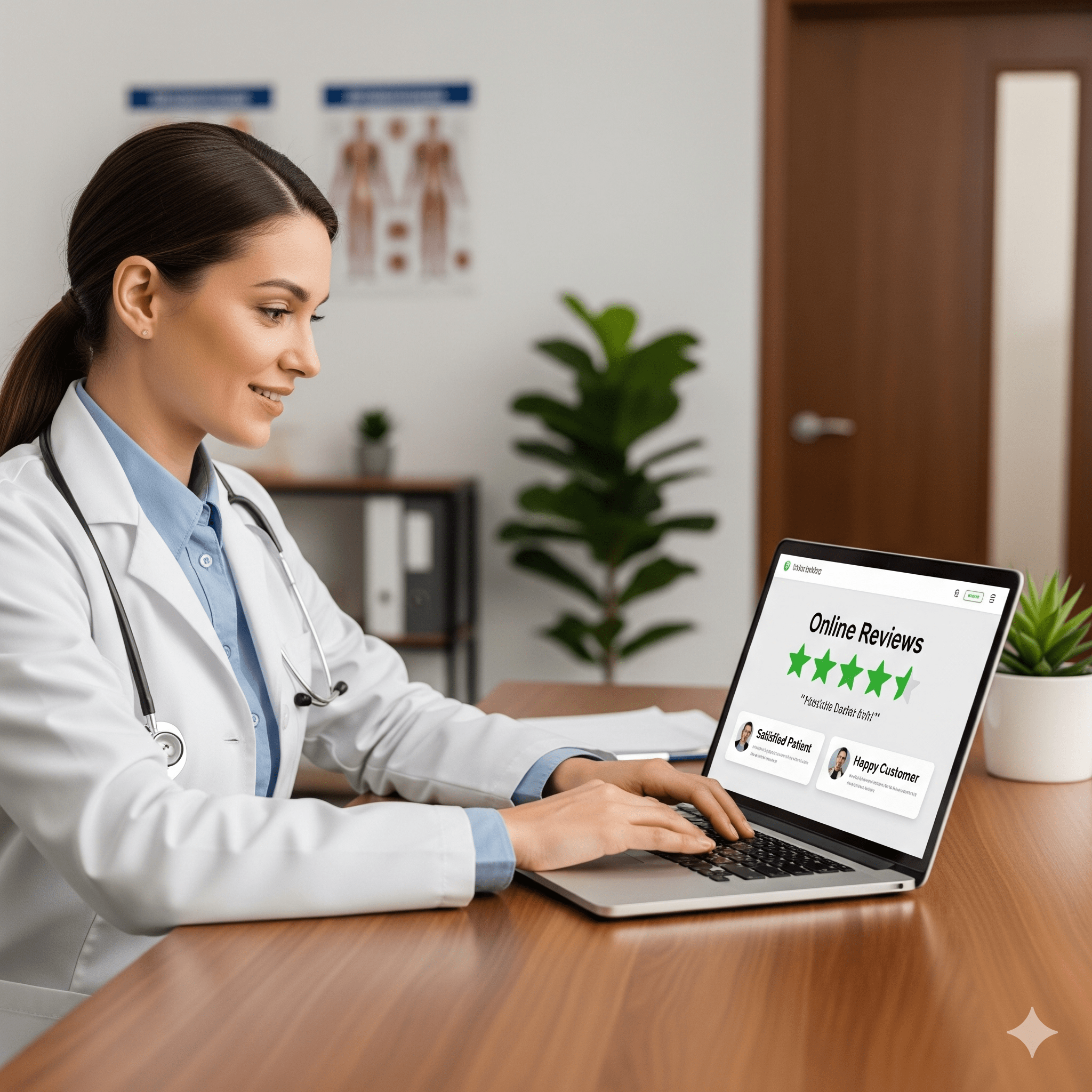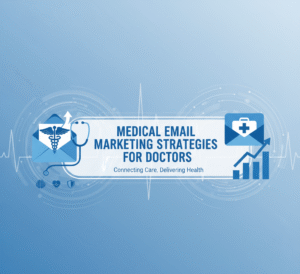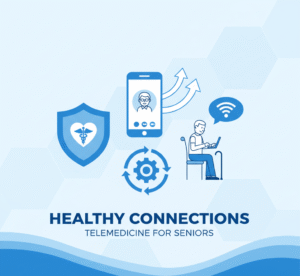“Learn why online reviews are the new word-of-mouth for building trust online, offering healthcare businesses a powerful way to build credibility, manage their digital reputation, and attract new patients.”
In today’s digital world, word-of-mouth for building trust online has taken on a new form: online reviews. This is especially true in the healthcare industry, where trust isn’t just a preference—it’s paramount. For doctors, clinics, and hospitals, what patients say about them online can make or break their practice. Think of online reviews as modern-day whispered recommendations, amplified by the internet. They carry immense weight, shaping perceptions and guiding decisions in a way traditional advertising simply can’t.
But why are these digital snippets so powerful? How do they build credibility, sway potential patients, and become an indispensable tool for healthcare marketing? This article dives deep into the profound impact of online reviews, offering practical insights for medical businesses aiming to solidify their digital reputation and foster genuine patient trust.
The Evolution of Trust: From Neighborhood Chats to Digital Echoes
For generations, finding a good doctor meant asking friends, family, or neighbors. “Who do you see?” “Are they good?” “Do they listen?” These questions led to trusted referrals, grounded in personal experience. This traditional word-of-mouth was the bedrock of reputation.
Those conversations still happen today, but they’re often preceded, supplemented, or even replaced by a quick search online. When someone needs a new physician, a specialist, or even an urgent care clinic, their first stop is usually Google. What they find there—specifically, the online reviews for healthcare—becomes their digital “neighborhood chat.”
A stellar online reputation, built on genuine patient testimonials, signals quality and reliability. Conversely, a poor one, or even a lack of reviews, can be a significant red flag. This shift isn’t just a trend; it’s a fundamental change in how trust is established and maintained in the healthcare landscape.
Why Patient Reviews Build Credibility: The Power of Social Proof
Credibility in healthcare isn’t about flashy ads; it’s about competence, empathy, and positive outcomes. Patient testimonials are powerful because they offer social proof. This psychological phenomenon explains why people are more likely to trust something if others they perceive as similar to themselves have also trusted it.
When prospective patients see dozens of positive reviews, they feel more confident. They see real people, often sharing real stories, about their experiences. This collective affirmation acts as a strong endorsement.
Here’s why this form of social proof is so effective:
- Authenticity: Reviews come from actual patients, not the practice’s marketing department. This makes them inherently more believable. They often include specific details about appointment experiences, staff interactions, and treatment results, which ring true to readers.
- Relatability: Patients often look for reviews from people with similar concerns or conditions. They can better envision their own positive experience when they find such reviews. This personal connection makes the information more relevant and impactful.
- Transparency: A robust collection of reviews, even with a few constructive criticisms, shows transparency. It indicates a practice that isn’t afraid to put itself out there. This openness further builds trust, suggesting the practice has nothing to hide.
- Volume and Consistency: A handful of positive reviews is good, but a consistent stream of many positive reviews across multiple platforms is exceptional. It shows a long-standing commitment to patient satisfaction and high-quality care, reinforcing that good experiences are the norm, not just isolated incidents.
Understanding and leveraging the inherent power of social proof is crucial for medical practices’ digital reputation management. It’s about letting patients speak for their quality of care.
How Online Reviews Influence Decision-Making: Beyond a Gut Feeling
The influence of online reviews extends far beyond simply building credibility. They actively shape patient decision-making at every stage of their healthcare journey. From initial search to making an appointment, reviews are a constant factor.
Consider a patient searching for a new primary care physician. They might have a few names from their insurance network. How do they choose?
- Initial Filtering: The first step often involves checking star ratings. A practice with a 4.5-star average immediately stands out over one with 3.0 stars. This acts as a quick, effective filter.
- Deeper Dive into Specifics: Patients start reading the comments once a few practices pass the initial star rating filter. They look for specifics: “Is the doctor attentive?” “How long are the wait times?” “Is the staff friendly?” “Do they explain things clearly?” These details address common anxieties and priorities.
- Validation of Referrals: Even if a patient receives a personal referral from a friend, they will likely still check online reviews. This isn’t a sign of distrust in the friend, but rather a desire for additional validation and a broader perspective. They want to confirm the friend’s positive experience isn’t an anomaly.
- Addressing Concerns: Reviews can also help patients identify and address potential concerns. If one review mentions long wait times but many others praise the doctor’s thoroughness, a patient might weigh these factors and decide the thoroughness is worth a longer wait. Conversely, consistently negative feedback on a specific issue, like poor communication, could be a deal-breaker.
- Setting Expectations: Reviews help set realistic expectations. A patient knows what to expect regarding the clinic environment, the staff’s demeanor, and the doctor’s communication style. Fewer surprises mean less potential for disappointment, which can lead to a more positive overall experience.
Building patient trust online hinges on providing accessible, positive, and consistent patient feedback. This feedback acts as a compass, guiding patients through the often-complex choices in healthcare.
Practical Ways Businesses Can Leverage Online Reviews to Strengthen Their Reputation
Understanding the power of reviews is one thing; actively harnessing it is another. For healthcare practices, leveraging online reviews requires a strategic, ongoing effort. It’s not a one-time task but a continuous process of engagement and improvement.
Here are practical strategies for effectively using online reviews to build and maintain a strong reputation:
1. Actively Solicit Reviews
Waiting for reviews to appear organically is a passive approach. Proactively asking for them is far more effective.
- Make it Easy: Provide clear, simple instructions on how and where to leave a review. This could be a small card at check-out, a link in a follow-up email, or a QR code in the waiting room. The easier it is, the more likely patients are to do it.
- Timely Requests: Send review requests shortly after a positive patient experience, such as after a successful appointment or treatment. The experience is fresh in their mind, making them more likely to share.
- Multiple Channels: Don’t limit requests to just one platform. Encourage reviews on Google My Business, Healthgrades, Vitals, Zocdoc, and Facebook. A diverse presence demonstrates broad patient satisfaction.
- Train Staff: Ensure all patient-facing staff understand the importance of reviews. They can subtly encourage patients by saying, “We’d love to hear about your experience if you have a moment to share it online.”
2. Respond to All Reviews (Positive and Negative)
Engaging with reviews shows you are attentive and value patient feedback. This is a critical component of digital reputation management.
- For Positive Reviews: Thank the patient for their kind words. A simple “Thank you for your feedback, we appreciate you choosing our practice!” goes a long way. Mentioning something specific from their review, if appropriate and general enough not to violate HIPAA, shows you truly read it.
- For Negative Reviews: This is where the real work happens. Respond promptly, professionally, and empathetically.
- Acknowledge and Apologize: Start by acknowledging their experience and apologizing for dissatisfaction. “We’re sorry you had a less-than-ideal experience.”
- Offer to Take Offline: Never engage in a back-and-forth public debate. Instead, offer a clear path to resolution by asking them to contact the practice directly. “Please contact our office manager at [phone number] so we can address your concerns directly.” This shows a commitment to resolving issues while protecting patient privacy.
- Avoid Defensiveness: Remain calm and professional. Your response isn’t just for the reviewer; it’s for all future patients who will read it. A well-handled negative review can build trust, showing that the practice cares about patient satisfaction and takes feedback seriously.
- Learn and Improve: Use negative feedback as a valuable tool for internal improvement. Are there recurring themes? Long wait times? Communication issues? Address these internally to prevent future similar complaints.
3. Integrate Reviews into Your Marketing Efforts
Don’t let your valuable patient testimonials sit idly. Weave them into your healthcare marketing strategies.
- Website Showcase: Dedicate a section of your website to patient testimonials. Feature prominent quotes, success stories (with patient permission), and links to your review profiles.
- Social Media Content: Share snippets of positive reviews on your social media channels. This provides authentic content and reminds followers of your commitment to patient care.
- Print Materials: Use compelling quotes from reviews in brochures, office signage, or waiting room displays. “Our patients say it best…”
- Internal Motivation: Share positive reviews with your staff. This will boost morale and reinforce the impact of their hard work, encouraging continued excellent service.
4. Monitor Your Online Presence Regularly
Online review platforms are constantly evolving, so it’s essential to stay informed about what’s being said about your practice.
- Set Up Alerts: Use tools like Google Alerts or specialized reputation management software to notify you when your practice is mentioned online.
- Regular Checks: Schedule routine checks of key review sites and social media platforms.
- Claim Your Profiles: Ensure your practice has claimed and optimized its profiles on all relevant review platforms. Fill out all information completely and accurately, including services, hours, and contact details.
5. Prioritize Patient Experience Above All Else
Ultimately, the best strategy for generating positive reviews is consistently providing an exceptional patient experience.
- Clinical Excellence: High-quality medical care is the foundation.
- Compassionate Staff: Train your team to be empathetic, friendly, and helpful. A warm greeting and a listening ear can make a huge difference.
- Efficient Operations: Minimize wait times, streamline scheduling, and ensure clear communication regarding appointments and billing.
- Clear Communication: Doctors and staff should clearly explain diagnoses and treatment plans, answer questions patiently, and ensure patients feel heard and understood.
- Follow-Up: A simple follow-up call after a procedure or a check-in email shows you care beyond the appointment.
By focusing on these areas, practices naturally encourage positive feedback, transforming patients into advocates.
The Impact on Healthcare Marketing: Beyond Traditional Advertising
For years, healthcare digital marketing relied heavily on traditional advertising methods—print ads, TV commercials, and direct mail. While these still have a place, their effectiveness pales in comparison to the authentic voice of patient reviews regarding trust in healthcare services.
Online reviews offer several distinct advantages that traditional advertising simply cannot match:
- Authenticity and Believability: Ads are inherently promotional. Reviews, by contrast, are perceived as unbiased accounts from real individuals, making them far more credible.
- Targeted Information: Prospective patients often search for precise information. Reviews usually contain details about a doctor’s specialty, approach, or bedside manner that resonate with these specific needs, making them highly relevant.
- Cost-Effectiveness: While reputation management requires an investment, the organic reach and conversion power of positive reviews often far outweigh the cost of paid advertising, providing an excellent return on investment.
- SEO Benefits: Google and other search engines factor review volume, recency, and star ratings into local search rankings. A strong review profile improves visibility, helping more patients find your practice. This is a crucial element of medical practice reputation.
- Competitive Advantage: Strong review profiles can be a decisive differentiator in a crowded healthcare market. When two practices offer similar services, the one with superior reviews almost always wins the patient.
- Real-time Feedback Loop: Reviews provide an immediate and unfiltered feedback loop. This allows practices to quickly identify areas for improvement, address patient concerns, and adapt their services to better meet patient needs. This dynamic responsiveness is something traditional, static advertising cannot offer.
In summary, online reviews aren’t just a marketing tool but a fundamental component of a modern healthcare marketing strategy. They are the digital pulse of a practice’s reputation, constantly broadcasting its strengths and areas for growth to a global audience.
Common Mistakes to Avoid with Online Reviews
While the benefits of online reviews are clear, there are pitfalls to avoid. Avoiding these common mistakes ensures that your efforts are productive and ethical.
- Ignoring Reviews (Especially Negative Ones): This is perhaps the biggest mistake. Unanswered reviews, particularly negative ones, signal indifference to patients. It implies that feedback doesn’t matter, eroding trust. A prompt, professional response, even to a critical review, shows you care and are willing to address concerns.
- Buying Fake Reviews is a clear ethical violation that can damage your reputation if discovered. Google and other platforms have sophisticated algorithms to detect fraudulent reviews, leading to penalties, including removal from search results. Authenticity is key. Patients can often spot generic or overly effusive fake reviews a mile away.
- Violating Patient Privacy (HIPAA): When responding to reviews, especially negative ones, never disclose Protected Health Information (PHI). Do not confirm a patient’s identity, discuss their diagnosis, or mention any aspect of their treatment. Your response should be general and invite them to discuss their concerns privately. For example, “We take patient feedback seriously and want to understand your experience better. Please contact our office manager directly at [phone number] to discuss this further.”
- Getting into Public Arguments: Engaging in a public back-and-forth with a disgruntled patient is unprofessional and counterproductive. It makes your practice look defensive and petty. Always aim to take the conversation offline.
- Only Soliciting Positive Reviews: While you naturally want positive feedback, actively suppressing or deleting negative reviews is unethical and can backfire. A mix of reviews, with overwhelmingly positive ones, appears more genuine. It’s okay to have a few less-than-perfect reviews if they are handled well.
- Not Having a Review Strategy: Simply hoping for reviews is not a strategy. Practices need a clear plan for encouraging, monitoring, responding to, and leveraging reviews. This includes assigning responsibilities and establishing protocols.
- Using Aggressive or Coercive Tactics: Never pressure patients into leaving a review. This can backfire and lead to resentment. Encourage, don’t demand.
- Neglecting Your Google My Business Profile: For many practices, Google My Business is the most critical review platform. Ensure your profile is fully optimized, accurate, and regularly updated. It’s often the first thing patients see.
By avoiding these missteps, medical practices can build a robust and trustworthy online presence that reflects their commitment to patient care.
Frequently Asked Questions (FAQs) About Online Reviews in Healthcare
Q1: Why are online reviews so critical for healthcare practices?
Online reviews are crucial because they are the modern equivalent of word-of-mouth referrals. They build credibility, influence patient decision-making, and significantly impact a practice’s digital reputation management. Patients heavily rely on them to choose providers, making them vital for growth and trust.
Q2: How can my practice get more patient reviews?
To get more reviews, make the process easy for patients. Ask for reviews after positive experiences, perhaps via a follow-up email with a direct link or a simple card at checkout. Ensure you request reviews across multiple platforms like Google, Healthgrades, and Vitals.
Q3: Should I respond to every online review, positive or negative?
Yes, absolutely. Responding to all reviews shows that your practice is engaged and values patient feedback. For positive reviews, a simple thank you is sufficient. Respond promptly and professionally to negative reviews, offering to take the conversation offline to resolve the issue while adhering to patient privacy (HIPAA) guidelines.
Q4: What should I do if I get a negative review?
First, don’t panic. Respond quickly, professionally, and empathetically. Apologize for the patient’s negative experience without admitting fault or discussing details. Most importantly, invite the patient to contact your office privately to resolve the issue. Never disclose protected health information (PHI) in your public response. Use negative feedback as a chance to learn and improve.
Q5: Can I remove a negative review that I believe is unfair or false?
Generally, no. Most review platforms only remove reviews that violate their specific terms of service (e.g., hate speech, spam, verifiable misinformation). Disagreeing with a review’s content is usually not enough for removal. Focus on responding professionally and accumulating positive reviews to balance the occasional negative.
Q6: How do online reviews affect my practice’s search engine ranking?
Online reviews significantly impact your local search engine optimization (SEO). Search engines like Google consider the number, average rating, and recency of reviews when determining how to rank local businesses. Positive reviews can improve your visibility, helping more potential patients find your practice.
Q7: Is it ethical to offer incentives for patient reviews?
Most major review platforms, including Google, discourage or prohibit offering incentives (e.g., discounts and gift cards) in exchange for reviews, which can be seen as biasing the feedback. It’s best to ask for honest feedback without any promise of reward. Focus on providing an excellent patient experience, which naturally encourages positive reviews.
Q8: What is HIPAA, and how does it relate to online review responses?
HIPAA (Health Insurance Portability and Accountability Act) is a U.S. law protecting patient health information. When responding to online reviews, especially negative ones, you must never disclose any protected health information (PHI) about the patient. This includes their name, appointment details, diagnosis, or health information. Your responses should be general and invite private communication.
Q9: Which online review platforms are most important for healthcare?
Google My Business is almost universally the most important due to its impact on local search. Other crucial platforms include Healthgrades, Vitals, Zocdoc, and Yelp. For specialists, profession-specific platforms may also be relevant. Having a strong presence across several platforms builds a robust medical practice reputation.
Q10: How often should I monitor my online reviews?
You should monitor your online reviews regularly, ideally daily or at least several times weekly. This allows you to respond promptly to new feedback, address emerging issues, and stay on top of your online review platforms. Many reputation management tools can send you alerts when new reviews are posted.













